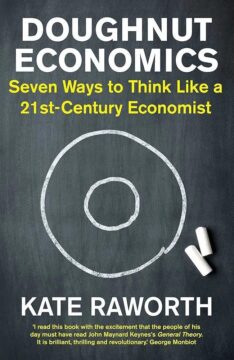Ashley Dawson at the Los Angeles Review of Books:
 ENERGY-RELATED CARBON EMISSIONS hit an all-time high in 2024, contributing to record atmospheric concentrations of CO2. As a result, last year was the warmest year on record, the first that was more than 1.5°C above preindustrial levels. But how is this possible given the record levels of global investment in and deployment of renewables, which reached an all-time high with 536 gigawatts of renewable capacity added in 2023?
ENERGY-RELATED CARBON EMISSIONS hit an all-time high in 2024, contributing to record atmospheric concentrations of CO2. As a result, last year was the warmest year on record, the first that was more than 1.5°C above preindustrial levels. But how is this possible given the record levels of global investment in and deployment of renewables, which reached an all-time high with 536 gigawatts of renewable capacity added in 2023?
The answer is that fossil fuels are not being replaced by renewables, as the term energy transition suggests. Instead, they are being added to the total energy supply. What we are witnessing, in other words, is energy addition rather than transition. Or, to put it another way, we are living through a green transition; it’s just that it’s not the one that climate activists, scientists, or, indeed, anyone concerned about life on this planet actually wants. This green transition is likely to blow us through 2.0°C of global warming by the end of the 2030s, with all the environmental and social disruption that this implies.
To win a decline in global emissions, we must shut down the ongoing fossil-fuel production that is driving energy addition.
More here.
Enjoying the content on 3QD? Help keep us going by donating now.

 While ants can be annoying (see: showing up at your picnic table), humans generally regard them as good workers, which is how they’ve often been portrayed in folklore and fables such as Aesop’s “
While ants can be annoying (see: showing up at your picnic table), humans generally regard them as good workers, which is how they’ve often been portrayed in folklore and fables such as Aesop’s “ Remember the last time you visited the doctor? They likely asked you about your medical history.
Remember the last time you visited the doctor? They likely asked you about your medical history. Here’s a very short, oversimplified history of modern economics. In the 1960s and 1970s, a particular way of thinking about economics crystallized in academic departments, and basically took over the top journals. It was very math-heavy, and it modeled the economy as the sum of a bunch of rational human agents buying and selling things in a market. Although the people who invented these methods (Paul Samuelson, Ken Arrow, etc.) were not very libertarian, in the 70s and 80s a bunch of conservative-leaning economists used the models to claim that free markets were great. The models turned out to be pretty useful for saying “free markets are great”, simply because math is hard — it’s a lot easier to mathematically model a simple, well-functioning market than it is to model a complex world where markets are only part of the story, and where markets themselves have lots of pieces that break down and don’t work.
Here’s a very short, oversimplified history of modern economics. In the 1960s and 1970s, a particular way of thinking about economics crystallized in academic departments, and basically took over the top journals. It was very math-heavy, and it modeled the economy as the sum of a bunch of rational human agents buying and selling things in a market. Although the people who invented these methods (Paul Samuelson, Ken Arrow, etc.) were not very libertarian, in the 70s and 80s a bunch of conservative-leaning economists used the models to claim that free markets were great. The models turned out to be pretty useful for saying “free markets are great”, simply because math is hard — it’s a lot easier to mathematically model a simple, well-functioning market than it is to model a complex world where markets are only part of the story, and where markets themselves have lots of pieces that break down and don’t work. Before moving to the United States at ten, I grew up surrounded by other Iranians. Aunts, uncles, cousins, and family friends who spoke my language and understood the nuances of my life. Then, in the suburbs of America, I suddenly understood isolation and loneliness. I was the new, dark kid from the country who took Americans hostage, the kid whose name, tastes and mannerisms were easy to mock, who didn’t know the rules to American sports or culture. My refuge from alienation came through stories. I came home from school every day and buried myself in fiction because it felt like the real world had no space for me. But the irony is that the fictional worlds I was most obsessed with had no place for me either.
Before moving to the United States at ten, I grew up surrounded by other Iranians. Aunts, uncles, cousins, and family friends who spoke my language and understood the nuances of my life. Then, in the suburbs of America, I suddenly understood isolation and loneliness. I was the new, dark kid from the country who took Americans hostage, the kid whose name, tastes and mannerisms were easy to mock, who didn’t know the rules to American sports or culture. My refuge from alienation came through stories. I came home from school every day and buried myself in fiction because it felt like the real world had no space for me. But the irony is that the fictional worlds I was most obsessed with had no place for me either. Senator Josh Hawley is
Senator Josh Hawley is  Following the shooting of Turning Point USA founder Charlie Kirk, Vox cofounder and podcast commentator Ezra Klein
Following the shooting of Turning Point USA founder Charlie Kirk, Vox cofounder and podcast commentator Ezra Klein  A person is a perpetual ongoingness perpetually mistaking itself for a still point. We call this figment personality or identity or self, and yet we are
A person is a perpetual ongoingness perpetually mistaking itself for a still point. We call this figment personality or identity or self, and yet we are  The
The  “Little Reunions ought to be burned,” Eileen Chang wrote to her friend and literary executor, Stephen Soong, in 1976, the year she finished what would be her last novel. When it was finally published, in 2009, fourteen years after her death, Little Reunions seemed to carry this curse with it; the book received widespread criticism for its cryptic narrative and for not sounding like Eileen Chang.
“Little Reunions ought to be burned,” Eileen Chang wrote to her friend and literary executor, Stephen Soong, in 1976, the year she finished what would be her last novel. When it was finally published, in 2009, fourteen years after her death, Little Reunions seemed to carry this curse with it; the book received widespread criticism for its cryptic narrative and for not sounding like Eileen Chang.